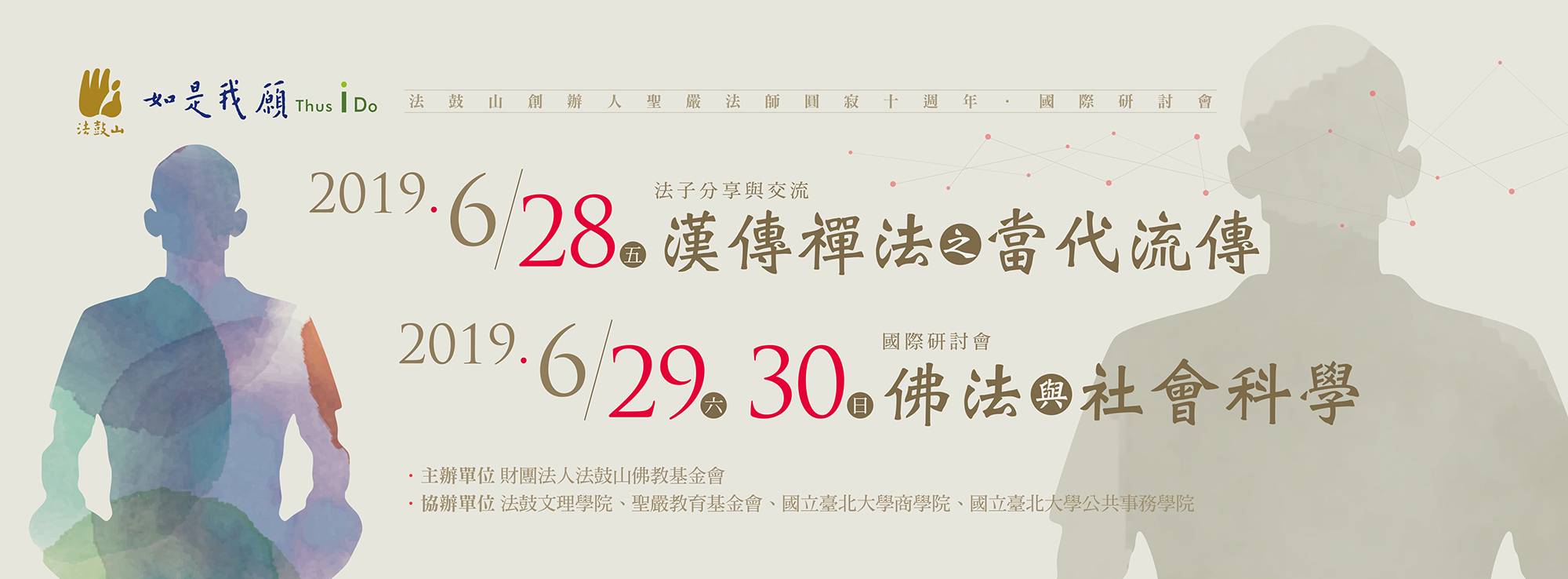默照禪的生活美學
陳武雄
主旨:簡論默照禪在生活中應用之妙,以期接引更多人修習。
在禪宗歷代祖師的語錄裡,可以發現與後世默照禪相符的見解,一直到宋朝曹洞宗的投子義青禪師(1032-1083年)才將默照鮮明的標舉出來教禪。後來宏智正覺禪師(1091-1157年)正式提出「默照禪」,與同時代臨濟宗大慧宗杲禪師(1089-1163)的「看話禪」並列為禪宗兩大門派。但到明末,曹洞門下都改用念佛或參話頭,與臨濟宗的修持已無不同。
默照禪在中國消失了近八百年,經過聖嚴法師在閉關中揣摩實修受用(1967年),其後又在日本留學時參訪、考證,完成博士學位後開始在美國教學、直到1999年他才確定他多年所修持的禪法應該就是失傳近八百年的默照禪。
默照禪最重要的修行方法是宏智禪師所說的「不觸事而知,其知自微;不對緣而照,其照自妙」。我們一般人六根對六塵的時候,經由後天學習累積而來的識心作用,產生分別、對待、取捨,其知與照都很有限。經由修習默照的三階段:只管打坐;體驗到環境和自己合而為一,可以進入向內觀照,內心無限深遠;向外觀照,外境無窮的廣大的境界,這是默照絕美之境。
一般人生活之中雖然尚不能做到無邊無界開悟境界的默照,但透過默照的修習,我們可以培養出一種既放鬆又開放明覺的素質。透過雜念的沉澱,讓平靜的覺性可以自然地浮現出來。而自己的身心與周邊人事物沒有對立、分別,這樣和諧融合自然流暢之美,却是我們可以去倘佯體驗的。
生活中如能把整個生命投入當下正在做的事,很清楚自己和周遭環境,自己的心像鏡子如實反映環境,但不隨環境的變動而起波瀾。例如在品茶的時候,放下自己先前的經驗及好惡,不預期不執取,沒有分別心,在虛靜的狀況下,六根全開,自然流暢的觸及茶的色、香、味、韻、氣;在聽音樂或大地的音聲時專念普聽,只讓一切聲音自然被聽到,沒有分別,最後可以進入聲音與自己無內外、無自他卻又歷歷分明,這也就是觀世音菩薩「入流亡所」的境界;又如走路時從制心一處開始到打開所有感官知覺,直觀覺知當下,去感受與環境的和諧和寧靜。學習將默照禪用在我們的生活中,活出禪的安詳、寧靜與智慧,在忙碌的工作中及競爭的壓力下,學會安定身心,體驗人生的豐富與美好。
在師父捨報十周年的日子,不揣淺陋,整理出自己經常享用默照的生活之美,拋磚引玉,祈望更多的善知識一起來加深擴大漢傳禪佛法的生活化及普及化,以報師恩。
關鍵字:美學、默照禪、話頭禪、曹洞宗、臨濟宗、宏智正覺、只管打坐
Aesthetics of Silent Illumination
Wu-Hsiung Chen
The essay is a brief introduction to Silent Illumination as is practiced in daily life, which hopefully may encourage more people to learn to practice it.
In the analects of early Chan patriarchs, there are views very similar to those held in Silent Illumination. Not until the Song dynasty did Silent Illumination begin to be taught as an independent school by Touzi Yiqing (1032-1082) of the Caodong line. Only afterwards was the name Mozhao Chan formally proposed by Hongzhi Zhengjue (1091-1157). It thus co-existed with Huatou Chan of Dahui Zhonggao (1089-1163) of the Linji line as two major schools of Chan.
Mozhao Chan had disappeared for nearly 800 years before it was rediscovered and practiced by Master Sheng-yen during a retreat in 1967. He continued to learn more about it during his subsequent visits and studies for a Ph. D. in Japan and then teaching in the U.S. Finally in 1999 he assured himself that the Chan he had been studying and practicing for years should be Mozhao Chan, or Silent Illumination, which had been lost for nearly 800 years.
The most important method of practicing Mozhao Chan is what was described by Hongzhi Zhengjue as “knowing is so subtle but not by touching it; observing is so wonderful but not by confronting it.” When our Six Sense-organs get in contact with Six Dusts, we can distinguish, handle, accept or reject things according to our consciousness accumulated through constant learning in our life . But such knowing and observing are very limited. Silent Illumination falls into three stages. The first is “just sitting.” In the second stage, you experience oneness with the environment enabling endless inwards observation. In the third stage, you will achieve outwards and boundless observation.
Although an average person cannot achieve boundless Illumination in daily life, we can, through practice, develop such qualities of relaxation coupled with open awareness, perfect stillness coupled with luminous clarity. By dispelling scattered thoughts, we can achieve a calm, enlightened mental state naturally. There will be no conflicts or differences between you and all surrounding people, things and objects. The beauty of such harmonious integration is well worth experiencing and enjoy in our daily life.
If you are fully devoted to what you are doing and fully aware of yourself and the surroundings, your mind will, like a mirror, reflect truthfully the environment, but not fluctuate with its changes. Before tasting tea, you should give up all previous experiences and preferences and harbor no expectation, no choice, and no distinction. In this state of emptiness, your six sense-organs will ensure an open mind, enabling you to appreciate the color, fragrance, flavor and aroma of the tea in a natural manner. When you concentrate on listening to music or the sound of nature, let all sounds be heard with no choice. Finally you will lie in a state of oneness with sound, without any separation between yourself and sound, and all sounds are clearly heard. This is the state in which Arya Avalokiteshvara found herself—“all sounds are heard but they do not stay in your mind.” When you keep concentrating on walking and open your six sense-organs, you can directly observe the current situation and experience a harmonious and quiet relationship with the surroundings. We should learn to apply Silent Illumination or Mozhao Chan in our daily life to derive calmness, serenity and wisdom. In a busy and competitive climate, we should practice Mozhao Chan to calm our body and mind and experience the abundance and beauty of human life.
To mark the 10th anniversary of Master Sheng-yen’s passing and requite his many kindnesses, I take the liberty of writing this essay to share what I have benefited from practicing Silent Illumination myself. I hope my example will encourage more “good, virtuous friends” to join forces to expand the practice of Chinese Chan Buddhism among the public.
